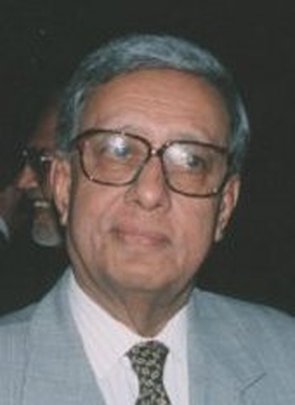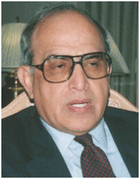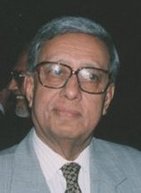
Exclusive Interview:
Justice ( R ) Sajjad Ali Shah
"The Light At The End Of The Tunnel"
"Our problems are peculiar to us, and we need to handle it our way. The only solution is accountability."
By: Tashbih Sayyed
According to independent observers, Mian Nawaz Sharif has an autocratic streak in his character that is maintained by his vengeful mentality. When Chief Justice Sajjad Ali Shah ordered the release of some civil servants who were arrested by order of the Prime Minister, Mian Nawaz Sharif, they automatically assumed that the Chief Justice was his rival. This became the starting point of a long tussle that culminated in an attack on the Supreme Court on November 28, 1997. Mian Nawaz Sharif took it upon himself to punish Justice Sajjad Ali Shah for his just and principled stand. This led to the establishment of special Courts, which were established in contravention of the Chief Justices judicious advice. These special courts, which were established to benefit the PM’s allies and supporters, eventually proved to be a humiliating blot on the face of justice in Pakistan. Later on when the Chief Justice wanted to fill the five vacant positions of judges to be able to carry out the business of dispensing justice in a speedy manner, the Prime Minister not only refused to grant the request but went ahead and abolished those vacancies altogether. He had to restore the positions under pressure but refused to fill them up.
The heavy mandate that Nawaz Sharif received from the people of Pakistan became his undoing. Thinking that because of an absolute majority in the assembly, he could get away with murder, he showed his true colors. One of the weapons that he employed extensively to disadvantage those he felt threatened by was creating rifts and dissension in their camps. In his self-imposed war against the Chief Justice he succeeded in dividing the judges into two camps. The group of judges that sided with the Prime Minister said openly that if Justice Sajjad Ali Shah give up trying cases against Mian Nawaz Sharif, they will accept him as the Chief Justice.
During this whole crisis, Justice Sajjad Ali Shah came out not only to be an extraordinary judicious mind but also a man of character that refused to compromise on principals in the face of extreme state pressures. He did not allow himself to be blackmailed by these moves. Justice Sajjad Ali Shah is credited for starting Judicial Activism in Pakistan. The legal experts are of the opinion that during this whole period when the Prime Minister was trying to humiliate him professionally, he remained within the framework of law. He did not lose his cool even when the government started trying to amend the constitution just to favor Nawaz Sharif. Mian Nawaz Sharif is not the only one who misunderstood him, but the other corrupt Prime Minister, Benazir Bhutto was also misguided by his sense of duty and responsibility, thinking that he was partially in her favor. Her misguidance is explained by factors that led to the appointment of Mr. Justice Sajjad as chief justice by her, as narrated by a political commentator, “ The main reason appears to be the short-sighted, narrow-minded and parochial approach of Benazir and her government. She was perhaps carried away by his two dissents, every time apparently in favor of the PPP. In Ahmad Tariq Rahim's case, in which the dismissal of the Benazir government by President Ghulam Ishaq Khan in 1990 was challenged, Justice Sajjad was one of the two dissenting judges who held in his dissenting opinion that the order of the President to dissolve the National Assembly was invalid. He observed that the purpose of dissolution was to get rid of the government of the PPP.
In the Nawaz Sharif case, when the dismissal of his government by President Ishaq came under challenge, Justice Sajjad was the lone dissenter out of eleven judges on the bench. He, in his dissenting opinion, upheld Ishaq's order as valid and expressed disapproval of the way the then CJ (Dr. Shah) had announced at the very beginning of the proceedings that the nation would hear good news. He also made a very pungent remark at the end of his judgment saying that when two PMs from Sindh were removed under the discretionary powers of the president, the Supreme Court did not restore them but when the turn of a PM from Punjab came, the tables had been turned. These remarks/observations of Justice Sajjad in these cases must have rankled Benazir's mind while she was deciding on his appointment. She might have thought that he, being a Sindhi and a sympathizer of the PPP (as it appeared to her from these judgments), would go along and protect the interests of her government.
Subsequent events have repelled this impression and established Justice Sajjad as a man of his own. His remarks in those judgments reflected his own thinking and not a bias in favor of the PPP, as was perhaps assumed. The assumption must have been based on myopic thinking that has lately developed in Pakistan's political circles that if someone disagrees or opposes one major political party, even out of his honest belief, he is believed to belong to the opposite camp. It was in such mistaken belief that the PPP government took the fateful decision of appointing Justice Sajjad on June 5, 1994.” Today, when it is so difficult for the masses to find even one person in whom they can put their trust in, Justice Sajjad’s personality seems a life-saver. Pakistan Today, in this exclusive interview with him, tried to assess his views on the current situation in Pakistan after the proclamation of the state of emergency by Chief Of Army Staff, General Pervez Musharraf.
Q: The present military chief executive is under a lot of pressure by the US especially to restore the civilian government, what is your comment?
Justice Sajjad Ali Shah: We have internal problems in the country, and they are of such a nature, that they have to be treated and solved first. Our main problem is corruption. Our economy has gone down because of deep rooted corruption in society. ..from bureaucrats and others. Eliminating corruption is crucial...any change to be brought about in the country, it must address corruption and accountability. Some time should be given to address these issues in great detail, so a recovery could be made to allow Pakistan to stand on its own two feet.
Q: Are you in favor of a caretaker government?
Justice Sajjad Ali Shah: Yes, a caretaker government is very essential right now. A caretaker government or whatever they (Chief Executive) have in mind, and they have announced now will continue until all corruption is eliminated.
Q: Even in caretaker governments, the same faces (corruption) seem to arise again. How can you prevent that?
Justice Sajjad Ali Shah: This is the main purpose of accountability. If accountability is done, and their is proof of corruption, then on that charge they can be disqualified, room will be made for new faces. This can only happen when accountability process is taken and applied to all without any discrimination. So, some time is required. We need to be able to stand on our own two feet. We have to be self-reliant. We need time for that. We need sympathy and support from other countries that are our friends. So we can be in a position to do something for our country. Our problems are peculiar to us, and we need to handle it our way. The only solution is accountability.
Q: Do you feel that the actions of General Musharruf are justified?
Justice Sajjad Ali Shah: He is justified because this is the need of the hour. Otherwise, this country would disintegrate. The system needs to be reformed, without reform I do not think the country can survive.
Q: Do you think that the Supreme Court can justify the General’s action?
Justice Sajjad Ali Shah: On the principle of doctrine of necessity, I think the changes in government can be justified. If there is no other alternative, no other way out, and this is the only solution available, then I think it is better to save the country, save the system then not.
Q: If you are offered a position in the new government, will you take it?
Justice Sajjad Ali Shah: I am prepared to make any contribution or sacrifice that is offered to me to help save my country.
Q: Can Pakistan withstand all the external pressures, if the IMF and the World Bank withhold money for example?
Justice Sajjad Ali Shah: I think if there is unity, and the intentions before us are lofty and noble, and we want an economic revival on the basis of self-reliance, there will be difficulties which we must withstand through coordination within our ranks, cooperation and good understanding.
Q: What kind of ideas do you have for the new government?
Justice Sajjad Ali Shah: I hope that this government has good intentions in their reforms. If there is rule of law in the system, and people are treated without discrimination, and corruption is also eliminated through accountability, I think we will be able to succeed in our objective and we can attain self-respect in the community of nations. Pakistanis abroad should help their homeland by molding opinion abroad to support us. They need to foster help, and understanding, otherwise the country is going to break up. The time has come to reform our system. This malady can be cured only through cooperation from all others who are our friends.
Q: Now, I would like to divert your attentions to comments to made by Benazir Bhutto, who has asked that elections be held within the next 90 days. What are your feelings on that?
Justice Sajjad Ali Shah: If elections are held within the next 90 days, then the reforms cannot be put into effect. Corruption cannot be eliminated. Real reforms can only take root through accountability which requires a longer period than 90 days. Naturally, politicians would not like to support accountability, because most of them will be found guilty. So, they want elections in the shortest amount of time so reforms cannot take place.
Q: When you were the Chief Justice of the Supreme Court and it came under attack by the Muslim League, there were at least three or four references against Nawaz Sharif pending in your court. Do you have any comments about their credibility?
Justice Sajjad Ali Shah: Yes, my anxiety at that time was, that the complaints contained allegations of corruption, and the cases should be looked into according to the law. Nawaz Sharif thought, because he was Prime Minister, the cases should not proceed against him. And, you see, the anxiety was that all should be treated equally under the law. He did not want those cases to be heard. That is because he did not believe in the rule of law. If there is no rule of law, then the system would collapse. This is what has happened in the country. there is no rule of law, no respect for it.
Q: Your removal was illegitimate, do you think they should offer you your position back?
Justice Sajjad Ali Shah: It is too late. Unless they amend the constitution. And the constitution should not be amended for one person. I want my country to be saved. Pakistan is a great country. I want the country to survive. For that I am prepared to offer my services in any capacity because I want the system to be saved.
Q: What problems do you foresee in the way for General Pervez Musharruf ?
Justice Sajjad Ali Shah: I think a lot of pressure will be placed from other countries to return to democratic government in the shortest amount of time. Some more time will be required though, so they should be patient, because we want to solve our problems first with their cooperation.
Justice ( R ) Sajjad Ali Shah
"The Light At The End Of The Tunnel"
"Our problems are peculiar to us, and we need to handle it our way. The only solution is accountability."
By: Tashbih Sayyed
According to independent observers, Mian Nawaz Sharif has an autocratic streak in his character that is maintained by his vengeful mentality. When Chief Justice Sajjad Ali Shah ordered the release of some civil servants who were arrested by order of the Prime Minister, Mian Nawaz Sharif, they automatically assumed that the Chief Justice was his rival. This became the starting point of a long tussle that culminated in an attack on the Supreme Court on November 28, 1997. Mian Nawaz Sharif took it upon himself to punish Justice Sajjad Ali Shah for his just and principled stand. This led to the establishment of special Courts, which were established in contravention of the Chief Justices judicious advice. These special courts, which were established to benefit the PM’s allies and supporters, eventually proved to be a humiliating blot on the face of justice in Pakistan. Later on when the Chief Justice wanted to fill the five vacant positions of judges to be able to carry out the business of dispensing justice in a speedy manner, the Prime Minister not only refused to grant the request but went ahead and abolished those vacancies altogether. He had to restore the positions under pressure but refused to fill them up.
The heavy mandate that Nawaz Sharif received from the people of Pakistan became his undoing. Thinking that because of an absolute majority in the assembly, he could get away with murder, he showed his true colors. One of the weapons that he employed extensively to disadvantage those he felt threatened by was creating rifts and dissension in their camps. In his self-imposed war against the Chief Justice he succeeded in dividing the judges into two camps. The group of judges that sided with the Prime Minister said openly that if Justice Sajjad Ali Shah give up trying cases against Mian Nawaz Sharif, they will accept him as the Chief Justice.
During this whole crisis, Justice Sajjad Ali Shah came out not only to be an extraordinary judicious mind but also a man of character that refused to compromise on principals in the face of extreme state pressures. He did not allow himself to be blackmailed by these moves. Justice Sajjad Ali Shah is credited for starting Judicial Activism in Pakistan. The legal experts are of the opinion that during this whole period when the Prime Minister was trying to humiliate him professionally, he remained within the framework of law. He did not lose his cool even when the government started trying to amend the constitution just to favor Nawaz Sharif. Mian Nawaz Sharif is not the only one who misunderstood him, but the other corrupt Prime Minister, Benazir Bhutto was also misguided by his sense of duty and responsibility, thinking that he was partially in her favor. Her misguidance is explained by factors that led to the appointment of Mr. Justice Sajjad as chief justice by her, as narrated by a political commentator, “ The main reason appears to be the short-sighted, narrow-minded and parochial approach of Benazir and her government. She was perhaps carried away by his two dissents, every time apparently in favor of the PPP. In Ahmad Tariq Rahim's case, in which the dismissal of the Benazir government by President Ghulam Ishaq Khan in 1990 was challenged, Justice Sajjad was one of the two dissenting judges who held in his dissenting opinion that the order of the President to dissolve the National Assembly was invalid. He observed that the purpose of dissolution was to get rid of the government of the PPP.
In the Nawaz Sharif case, when the dismissal of his government by President Ishaq came under challenge, Justice Sajjad was the lone dissenter out of eleven judges on the bench. He, in his dissenting opinion, upheld Ishaq's order as valid and expressed disapproval of the way the then CJ (Dr. Shah) had announced at the very beginning of the proceedings that the nation would hear good news. He also made a very pungent remark at the end of his judgment saying that when two PMs from Sindh were removed under the discretionary powers of the president, the Supreme Court did not restore them but when the turn of a PM from Punjab came, the tables had been turned. These remarks/observations of Justice Sajjad in these cases must have rankled Benazir's mind while she was deciding on his appointment. She might have thought that he, being a Sindhi and a sympathizer of the PPP (as it appeared to her from these judgments), would go along and protect the interests of her government.
Subsequent events have repelled this impression and established Justice Sajjad as a man of his own. His remarks in those judgments reflected his own thinking and not a bias in favor of the PPP, as was perhaps assumed. The assumption must have been based on myopic thinking that has lately developed in Pakistan's political circles that if someone disagrees or opposes one major political party, even out of his honest belief, he is believed to belong to the opposite camp. It was in such mistaken belief that the PPP government took the fateful decision of appointing Justice Sajjad on June 5, 1994.” Today, when it is so difficult for the masses to find even one person in whom they can put their trust in, Justice Sajjad’s personality seems a life-saver. Pakistan Today, in this exclusive interview with him, tried to assess his views on the current situation in Pakistan after the proclamation of the state of emergency by Chief Of Army Staff, General Pervez Musharraf.
Q: The present military chief executive is under a lot of pressure by the US especially to restore the civilian government, what is your comment?
Justice Sajjad Ali Shah: We have internal problems in the country, and they are of such a nature, that they have to be treated and solved first. Our main problem is corruption. Our economy has gone down because of deep rooted corruption in society. ..from bureaucrats and others. Eliminating corruption is crucial...any change to be brought about in the country, it must address corruption and accountability. Some time should be given to address these issues in great detail, so a recovery could be made to allow Pakistan to stand on its own two feet.
Q: Are you in favor of a caretaker government?
Justice Sajjad Ali Shah: Yes, a caretaker government is very essential right now. A caretaker government or whatever they (Chief Executive) have in mind, and they have announced now will continue until all corruption is eliminated.
Q: Even in caretaker governments, the same faces (corruption) seem to arise again. How can you prevent that?
Justice Sajjad Ali Shah: This is the main purpose of accountability. If accountability is done, and their is proof of corruption, then on that charge they can be disqualified, room will be made for new faces. This can only happen when accountability process is taken and applied to all without any discrimination. So, some time is required. We need to be able to stand on our own two feet. We have to be self-reliant. We need time for that. We need sympathy and support from other countries that are our friends. So we can be in a position to do something for our country. Our problems are peculiar to us, and we need to handle it our way. The only solution is accountability.
Q: Do you feel that the actions of General Musharruf are justified?
Justice Sajjad Ali Shah: He is justified because this is the need of the hour. Otherwise, this country would disintegrate. The system needs to be reformed, without reform I do not think the country can survive.
Q: Do you think that the Supreme Court can justify the General’s action?
Justice Sajjad Ali Shah: On the principle of doctrine of necessity, I think the changes in government can be justified. If there is no other alternative, no other way out, and this is the only solution available, then I think it is better to save the country, save the system then not.
Q: If you are offered a position in the new government, will you take it?
Justice Sajjad Ali Shah: I am prepared to make any contribution or sacrifice that is offered to me to help save my country.
Q: Can Pakistan withstand all the external pressures, if the IMF and the World Bank withhold money for example?
Justice Sajjad Ali Shah: I think if there is unity, and the intentions before us are lofty and noble, and we want an economic revival on the basis of self-reliance, there will be difficulties which we must withstand through coordination within our ranks, cooperation and good understanding.
Q: What kind of ideas do you have for the new government?
Justice Sajjad Ali Shah: I hope that this government has good intentions in their reforms. If there is rule of law in the system, and people are treated without discrimination, and corruption is also eliminated through accountability, I think we will be able to succeed in our objective and we can attain self-respect in the community of nations. Pakistanis abroad should help their homeland by molding opinion abroad to support us. They need to foster help, and understanding, otherwise the country is going to break up. The time has come to reform our system. This malady can be cured only through cooperation from all others who are our friends.
Q: Now, I would like to divert your attentions to comments to made by Benazir Bhutto, who has asked that elections be held within the next 90 days. What are your feelings on that?
Justice Sajjad Ali Shah: If elections are held within the next 90 days, then the reforms cannot be put into effect. Corruption cannot be eliminated. Real reforms can only take root through accountability which requires a longer period than 90 days. Naturally, politicians would not like to support accountability, because most of them will be found guilty. So, they want elections in the shortest amount of time so reforms cannot take place.
Q: When you were the Chief Justice of the Supreme Court and it came under attack by the Muslim League, there were at least three or four references against Nawaz Sharif pending in your court. Do you have any comments about their credibility?
Justice Sajjad Ali Shah: Yes, my anxiety at that time was, that the complaints contained allegations of corruption, and the cases should be looked into according to the law. Nawaz Sharif thought, because he was Prime Minister, the cases should not proceed against him. And, you see, the anxiety was that all should be treated equally under the law. He did not want those cases to be heard. That is because he did not believe in the rule of law. If there is no rule of law, then the system would collapse. This is what has happened in the country. there is no rule of law, no respect for it.
Q: Your removal was illegitimate, do you think they should offer you your position back?
Justice Sajjad Ali Shah: It is too late. Unless they amend the constitution. And the constitution should not be amended for one person. I want my country to be saved. Pakistan is a great country. I want the country to survive. For that I am prepared to offer my services in any capacity because I want the system to be saved.
Q: What problems do you foresee in the way for General Pervez Musharruf ?
Justice Sajjad Ali Shah: I think a lot of pressure will be placed from other countries to return to democratic government in the shortest amount of time. Some more time will be required though, so they should be patient, because we want to solve our problems first with their cooperation.

 RSS Feed
RSS Feed



